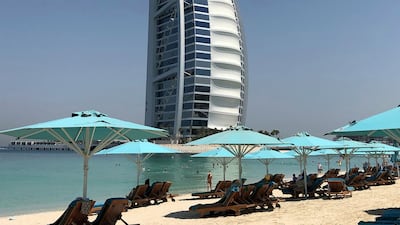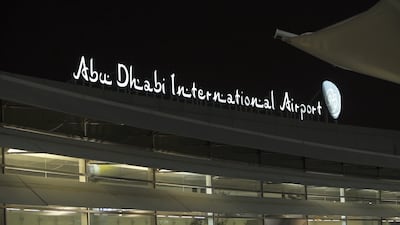Abu Dhabi Airports raised its passenger forecast for the full year after a strong performance in the third quarter of 2022, as the aviation industry continues to recover "remarkably" from the Covid-19 pandemic.
Passenger traffic across Abu Dhabi's five airports is expected to reach more than 15 million people in 2022, up from an August forecast of at least 13 million and a February estimate of 10.7 million, the state-owned airports operator said on Monday.
A total of 4.7 million passengers travelled through Abu Dhabi's five hubs in the third quarter, up from 1.3 million passengers in the same quarter of 2021, as the UAE capital attracted more airline customers and launched new routes.
“These figures are a demonstration of how the aviation industry has recovered remarkably," said Jamal Salem Al Dhaheri, managing director and chief executive of Abu Dhabi Airports.
"New airlines and air routes continue to be attracted to Abu Dhabi, while new and improved services have played a prominent role in accommodating the expected surging demand head-on."
Abu Dhabi Airports owns and operates Abu Dhabi International, Al Ain International, Al Bateen Executive, Delma Island and Sir Bani Yas Island airports.
The global tourism industry is on track to reach 65 per cent of pre-pandemic levels of international visitors by the end of this year as the sector, led by Europe, recovers from the worst crisis in its history.
The industry could bring in $1.2 trillion to $1.3 trillion in tourism revenue this year, a 60 per cent to 70 per cent increase over 2021, according to the latest data from the UN World Tourism Organisation (UNWTO). This year's revenue forecast is 70 per cent to 80 per cent of the $1.8 trillion the global industry generated in 2019.
In the first nine months of 2022, an estimated 700 million tourists travelled internationally, more than double the number for the same period last year, the UN tourism body said last week.
Another report from the World Travel and Tourism Council showed that international travel had returned to its highest point since the start of the pandemic. More than 63 per cent of people plan to take an overseas leisure trip in the next 12 months, according to the latest report conducted by YouGov for WTTC.









The recovery at Abu Dhabi International Airport, a hub for Etihad Airways, continued with strong travel demand during the peak summer season as international borders reopened and coronavirus restrictions eased.
The Gulf hub benefitted from running smooth operations, compared with some major European airports that were left reeling from delays that caused widespread disruption as demand roared back after the pandemic.
The top-five countries in terms of the increase in passenger volume during the third quarter were from India (933,640), the UK (291,576), Pakistan (265,793), Saudi Arabia (217,656) and Egypt (197,193), Abu Dhabi Airports said.
The busiest destinations served during the July to September period included London Heathrow (232,002), Mumbai International (155,294), Delhi International (130,723), Cairo International (118,885) and Kochi International Airport (101,828).
Year to date, the five airports handled 10,982,114 passengers by the end of September, which is equivalent to passenger traffic in 2020 and 2021 combined, Abu Dhabi Airports said.
"For Abu Dhabi Airports, 2022 has been a year of sustained momentum," Mr Al Dhaheri said.
In terms of air cargo, Abu Dhabi International Airport handled 144,083 tonnes of air freight in the third quarter, compared with 182,929 tonnes during the same period in 2021.
The decline in freight volume was due to airlines "rebalancing the fleet between passenger and cargo aircraft", the airports operator said.


